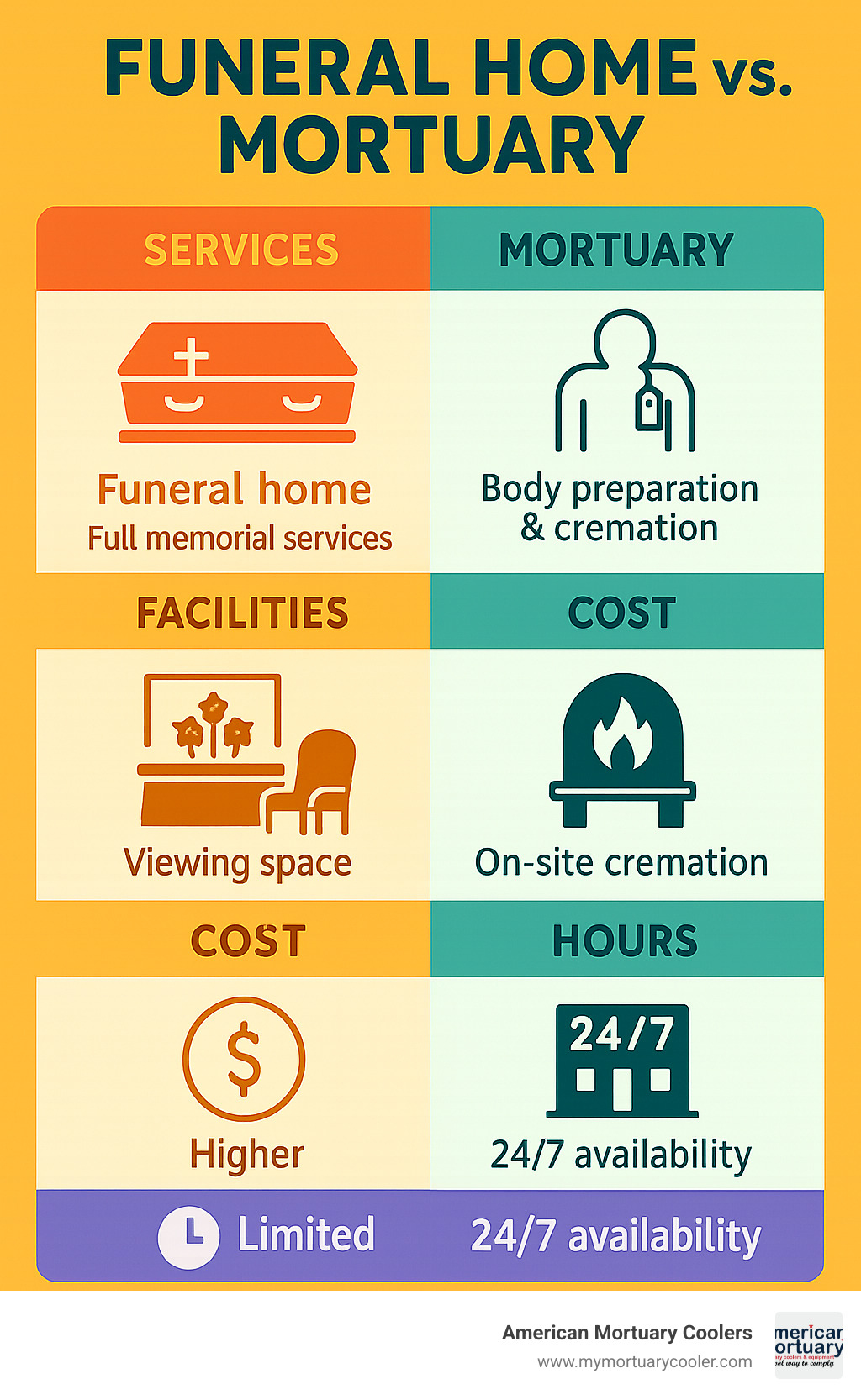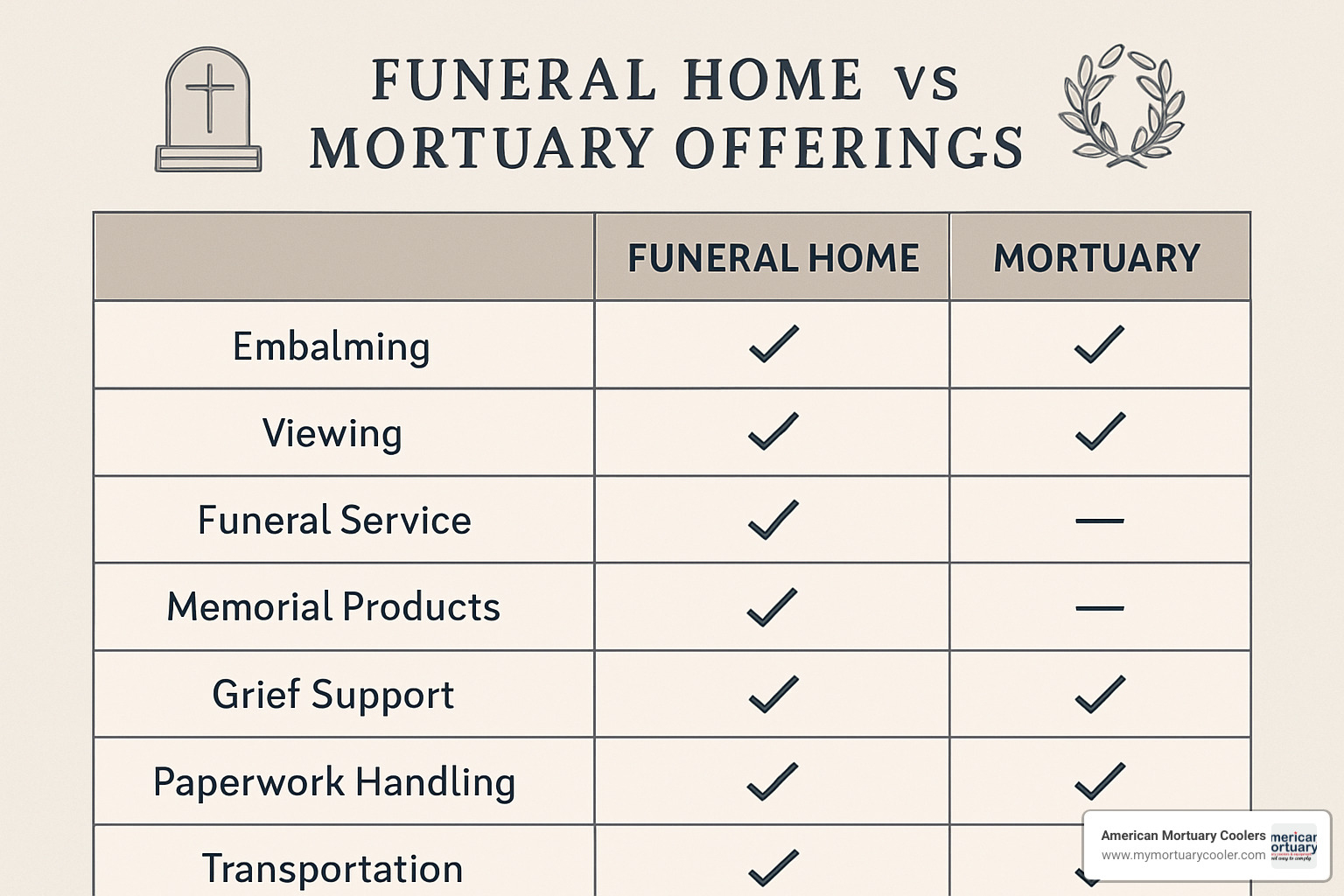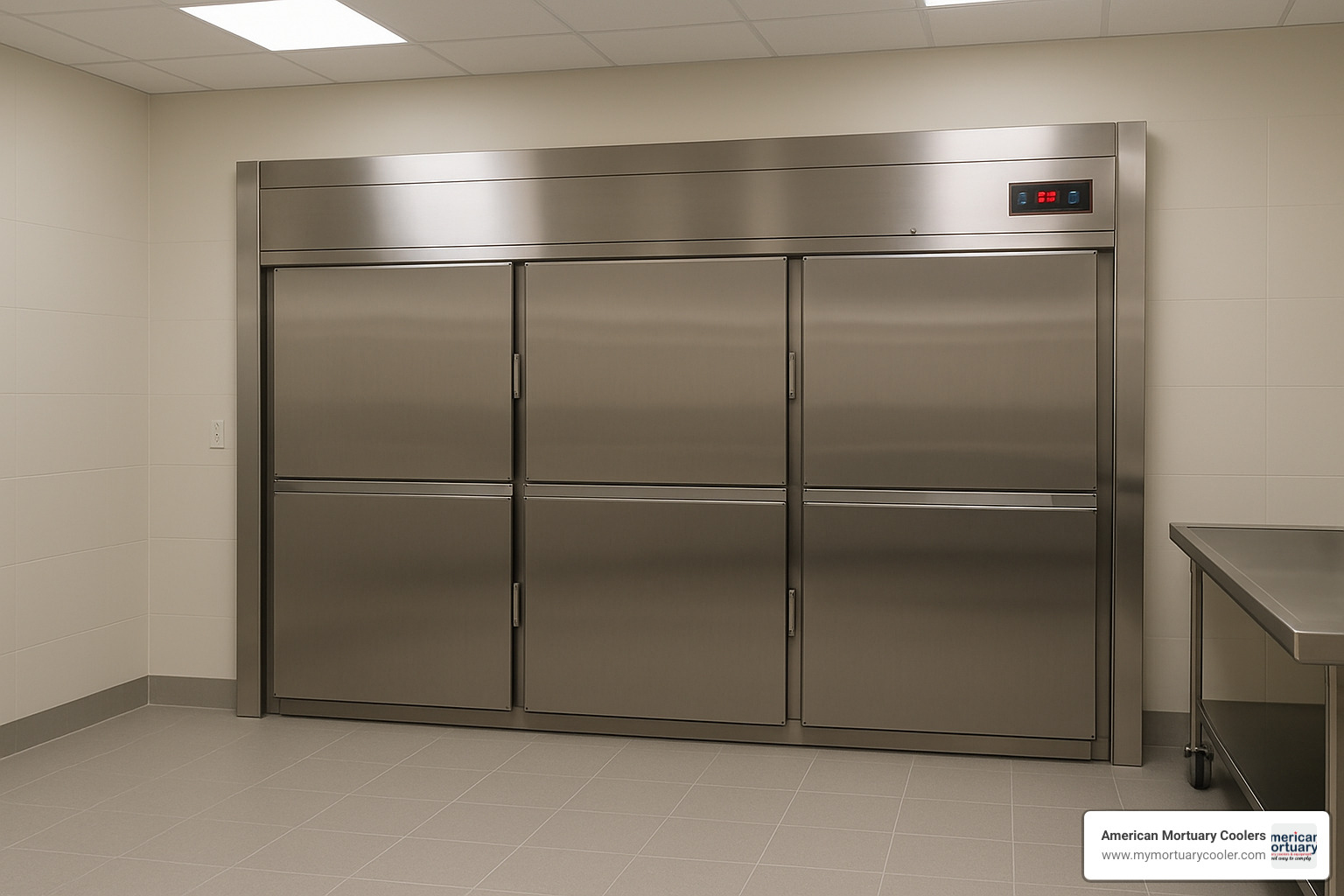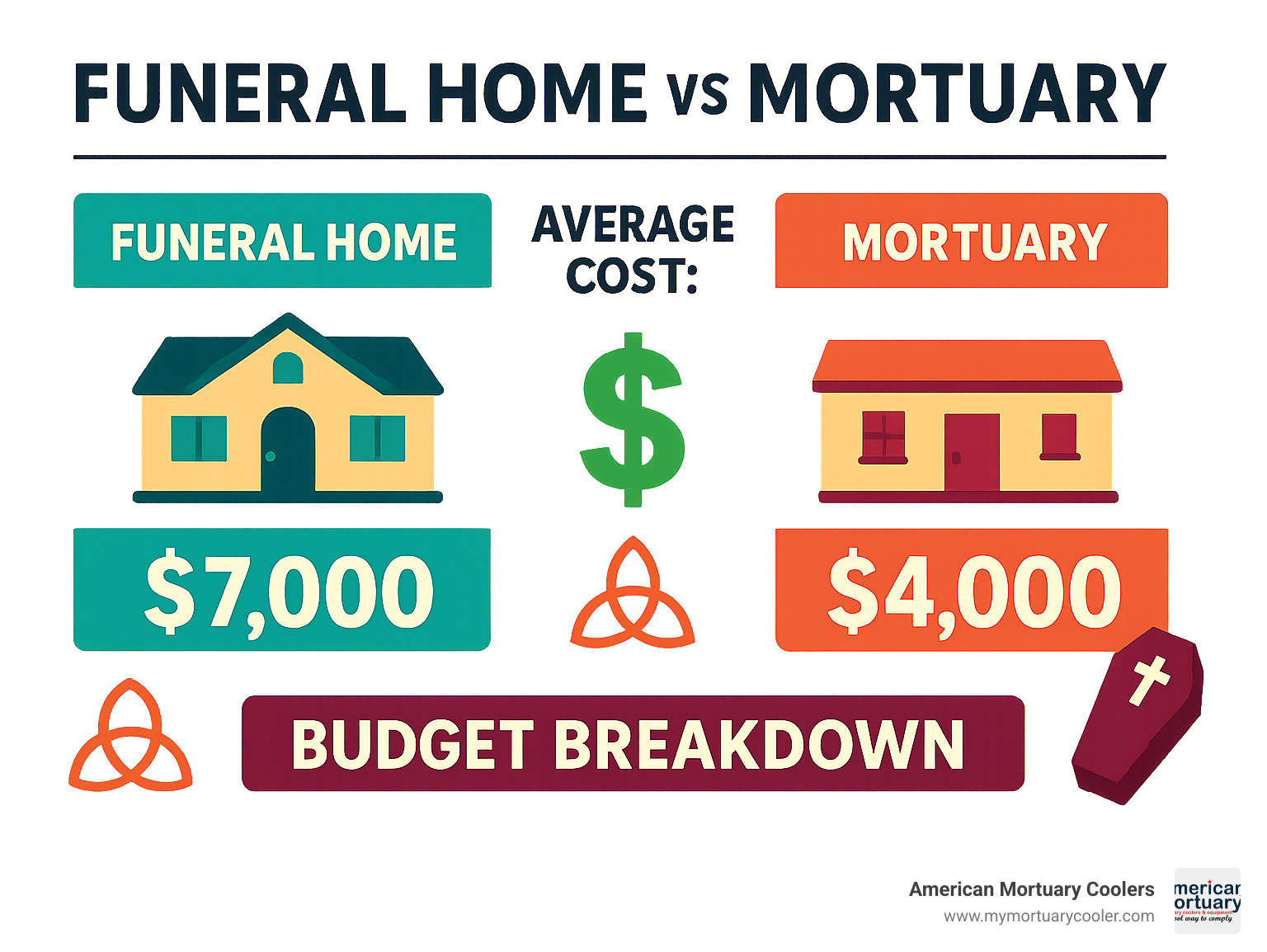Why Understanding Funeral Home vs Mortuary Differences Matters
When facing end-of-life arrangements, the funeral home vs mortuary decision can feel overwhelming during an already difficult time. While both facilities prepare the deceased for burial or cremation and handle required paperwork, they differ significantly in their service focus and available amenities.
Quick Answer: Key Differences
- Funeral Homes: Full-service facilities offering grief counseling, large viewing spaces, event coordination, and comprehensive memorial services (often outsource cremation)
- Mortuaries: Focus on body preparation and mortuary sciences, typically offer on-site cremation, limited family amenities, and more cost-effective basic services
- Cost: Mortuaries generally cost less due to lower overhead and fewer comfort amenities
- Hours: Mortuaries often operate 24/7, while funeral homes have more limited hours
According to industry research, 68% of professionals agree that the terms can be used interchangeably in many contexts, while 38% believe there are meaningful differences based on services offered and regional usage patterns.
The choice between these facilities affects everything from your budget to the level of emotional support your family receives. Funeral homes typically provide opulent surroundings with grief counseling and multimedia capabilities, while mortuaries emphasize the technical aspects of body preparation and may offer fewer customer comfort amenities at lower prices.
As American Mortuary Coolers with extensive experience as a national-level mortuary cooler supplier, we've worked directly with facilities across the funeral home vs mortuary spectrum to understand their unique operational needs and equipment requirements.

Why the Distinction Matters
The funeral home vs mortuary choice creates significant implications beyond just terminology. Families often experience choice anxiety when they don't understand the fundamental differences between these facilities. This confusion can lead to mismatched expectations about services, pricing, and the level of support available during grief.
Cost clarity becomes crucial when budgets are tight. Mortuaries typically offer more straightforward, lower-cost options focused on essential services, while funeral homes provide comprehensive packages that include emotional support and event coordination.
Service scope varies dramatically between the two facility types. If you're seeking a traditional funeral with extensive family support, multimedia presentations, and large gathering spaces, a funeral home aligns better with your needs. However, if you prefer direct cremation with minimal ceremony, a mortuary's streamlined approach may be more appropriate.
Funeral Home vs Mortuary: Quick Definitions
When you're dealing with loss, understanding the difference between these two types of facilities can help you make the right choice for your family. Think of it this way: funeral homes are like full-service event venues that happen to specialize in memorials, while mortuaries are more like specialized preparation laboratories focused on the technical side of caring for your loved one.
A funeral home operates as your one-stop destination for everything memorial-related. These facilities are designed with families in mind, offering comfortable spaces where you can gather, grieve, and celebrate a life well-lived. They handle the big picture - from helping you plan the service to coordinating with cemeteries and providing ongoing support.
Mortuaries take a different approach. They're the behind-the-scenes specialists who focus on mortuary science - the technical art of body preparation, embalming, and preservation. You'll often find mortuaries tucked away in hospital complexes or connected to crematory facilities, emphasizing function over family comfort.
Here's where things get really interesting: crematory access. Many mortuaries offer on-site cremation, meaning your loved one never leaves their care. Funeral homes typically work with separate crematory facilities, which means transportation and coordination with other providers.
Regional naming adds another layer to the funeral home vs mortuary puzzle. If you're in the North, you'll hear "funeral home" more often. Head South, and "mortuary" becomes the go-to term.
Funeral Home vs Mortuary: Side-by-Side Snapshot
The funeral home vs mortuary difference becomes crystal clear when you walk through their doors.
Funeral homes welcome you with extensive family amenities - think comfortable seating areas where relatives can gather, refreshment facilities for long days, and multimedia capabilities for photo tributes or live-streaming services. Their viewing chapels are designed for crowds, with plenty of space for public gatherings and formal ceremonies.
You'll work with licensed funeral directors who've received training in both logistics and grief counseling. These professionals focus on your family's needs, guiding you through decisions while providing emotional support throughout the memorial process.
Mortuaries operate with streamlined efficiency. Their facilities focus on what's essential - professional body preparation and core services. Viewing areas tend to be smaller and more intimate, typically designed for immediate family rather than large gatherings.
The staff at mortuaries are technical specialists in mortuary sciences and body preparation. While they're professional and respectful, their expertise lies in the scientific aspects of their work rather than family counseling.
Funeral Home vs Mortuary: Historical & Regional Roots
The funeral home vs mortuary distinction evolved from centuries of caring for the deceased. Ancient Egyptians perfected embalming techniques that still influence modern practices, but our current terminology tells a more recent story about how death care became professionalized.
The term "funeral home" emerged as the industry grew and began offering comprehensive family services. As communities became less tight-knit and families needed more help navigating death-related logistics, these businesses evolved to fill that gap.
Regional usage patterns developed naturally across the United States. Northern states gravitated toward "funeral home" terminology, emphasizing the comfort and home-like atmosphere these facilities provided. Southern regions stuck with "mortuary" usage, reflecting the profession's historical connection to mortuary sciences and technical preparation.
Industry research reveals interesting perspectives through a LinkedIn poll showing that while 68% of professionals consider the terms interchangeable, 38% believe meaningful differences exist.
Scientific research on grief support shows why understanding these distinctions matters when families need appropriate emotional and logistical support during bereavement.
What Is a Funeral Home?
A funeral home serves as your comprehensive death care partner, designed to support families through every aspect of the memorial process. These establishments don't just handle the basics - they coordinate everything from intimate family gatherings to large celebrations of life.
Event coordination represents the heart of funeral home services. Staff members work closely with your family to plan visitations, memorial services, and burial ceremonies. They handle the logistics you might not even think about - floral arrangements, music selection, guest accommodation, and timing coordination.
Grief counseling sets funeral homes apart from basic service providers. Licensed funeral directors receive formal training in bereavement support, helping families process emotions while making necessary arrangements. This support often continues long after the memorial service ends.
Product sales form a significant part of funeral home operations. These facilities typically maintain showrooms displaying caskets, urns, memorial jewelry, and other commemorative items.
Most funeral homes arrange off-site cremation services. While they coordinate everything for you, they transport remains to separate crematories for the actual process.
For more detailed information about funeral home operations and supply needs, check out our comprehensive guide on funeral home supplies.
What Is a Mortuary?
A mortuary specializes in mortuary science - the technical aspects of body preparation, preservation, and disposition. These facilities focus on providing excellent professional care for your loved one rather than extensive family services or memorial coordination.
Mortuary science encompasses embalming, restoration, and preparation techniques that preserve remains for viewing or final disposition. Staff members typically hold specialized certifications in these technical procedures, emphasizing scientific precision and professional expertise.
On-site crematory facilities distinguish many mortuaries from funeral homes. This capability allows mortuaries to maintain complete custody of remains throughout the entire process, eliminating transportation requirements and third-party coordination.
Limited visitation characterizes most mortuary operations. While they provide viewing opportunities, these facilities typically accommodate immediate family members rather than large public gatherings.
Many mortuaries operate within hospital complexes, medical centers, or crematory facilities. This integration provides operational efficiency and proximity to other death-related services.
For comprehensive information about mortuary operations and terminology, explore our detailed resource: The complete guide to mortuary meaning and definition.
Core Services & Amenities Compared
When you're trying to understand the funeral home vs mortuary difference, looking at their actual services tells the real story. Both handle the essential paperwork that comes with death - those death certificates, burial permits, and all the coordination with coroners that families shouldn't have to worry about during grief.
But here's where things get interesting. Think of funeral homes as the full-service option, like staying at a resort versus a budget hotel. They're both going to meet your basic needs, but the experience feels completely different.
Transportation services show this perfectly. Funeral homes treat transportation as part of the overall experience - they'll coordinate everything from the initial removal to the final destination, often with ceremonial vehicles and careful attention to dignity. Mortuaries handle transportation professionally and efficiently, but without the extra touches.
The memorial products difference really stands out when you visit both types of facilities. Funeral homes typically maintain showrooms that feel more like furniture stores, with extensive casket displays, urn collections, and memorial jewelry options. Mortuaries take a more straightforward approach with essential products focused on function over extensive choice.
Aftercare programs represent one of the biggest distinctions between facility types. Funeral homes often provide ongoing grief support, send anniversary cards, and connect families with bereavement resources months after the service. Mortuaries typically complete their relationship once the immediate disposition is handled.

Preparation & Care of the Body
Both funeral homes and mortuaries handle embalming services, but their approach tells you a lot about their overall philosophy. Funeral homes integrate embalming into a comprehensive preparation package that includes detailed cosmetic work, careful dressing, and positioning for optimal viewing. They're thinking about how your loved one will look during the service and how that affects your family's comfort.
Mortuaries approach embalming as a technical procedure within mortuary science. The work is thorough and professional, but the emphasis stays on preservation and sanitation rather than extensive cosmetic improvement.
Refrigeration capabilities vary significantly between facilities, and this is something we see regularly at American Mortuary Coolers. Mortuaries typically invest in more extensive cooling systems because their technical focus often requires longer-term storage capabilities.
Dressing and positioning services reflect each facility's priorities. Funeral homes provide comprehensive assistance with clothing selection, jewelry placement, and positioning that creates the most peaceful appearance for family viewing. Mortuaries handle dressing professionally but with less emphasis on aesthetic consultation.
Family-Facing Services
The viewing arrangements really showcase the biggest differences in the funeral home vs mortuary comparison. When you walk into a funeral home's viewing area, you'll find spacious, comfortable rooms designed for extended family gatherings. These spaces include adequate seating for large groups, proper lighting that feels warm rather than clinical, and climate control that keeps everyone comfortable during longer visitations.
Mortuaries take a more practical approach to viewings. They provide respectful, professional viewing opportunities, but typically in smaller spaces designed for immediate family rather than large gatherings.
Memorial technology has become a significant differentiator for modern funeral homes. Many now offer multimedia presentations that celebrate your loved one's life, live streaming capabilities for distant family members, and digital memorial creation services.
Chapel facilities at funeral homes accommodate formal memorial services with appropriate seating, sound systems, and staging areas for meaningful ceremonies. Mortuaries rarely maintain dedicated chapel spaces, instead focusing their resources on efficient preparation and basic viewing capabilities.
Cremation & Burial Logistics
Direct cremation services highlight some of the most practical differences between facility types. Mortuaries with on-site crematories can provide streamlined direct cremation without the coordination headaches that come with multiple service providers. This integration often results in lower costs and simplified logistics for families who prefer basic cremation services.
Funeral homes typically coordinate cremation through established relationships with separate crematory facilities. While this arrangement provides access to cremation services, it requires transportation coordination, scheduling with third parties, and often results in higher overall costs.
On-site versus off-site cremation capabilities represent one of the most significant operational distinctions in the funeral home vs mortuary comparison. Mortuaries frequently invest in crematory equipment, allowing them to maintain complete custody of remains throughout the entire disposition process.
For detailed information about how on-site cremation operations work and their advantages, you can explore on-site cremation details to understand the technical and logistical benefits of integrated facilities.
Facilities, Equipment & On-Site Capabilities
When you walk into a funeral home versus a mortuary, the physical differences become immediately apparent. Funeral homes design their spaces around family comfort, with welcoming lobbies, spacious viewing rooms, and chapel areas that feel more like a comfortable community center than a clinical facility.
Mortuaries take a more streamlined approach to their facilities. Their spaces prioritize efficiency and technical excellence over comfort amenities. The preparation areas resemble laboratory settings, with specialized equipment and workflow designed for high-volume, professional body preparation.
At American Mortuary Coolers, we've installed refrigeration systems in facilities across the funeral home vs mortuary spectrum. Each type has unique needs - funeral homes might need smaller capacity units with quieter operation for their family-focused environment, while mortuaries often require larger, more robust systems for extended storage capabilities.
Chapel space creates one of the most obvious distinctions between these facilities. Funeral homes invest significantly in dedicated chapel areas with proper seating for 50-200 people, sound systems, and staging areas for memorial services. Most mortuaries skip these expensive amenities entirely, focusing their resources on behind-the-scenes preparation capabilities.

Behind the Scenes Technology
The heart of any death care facility lies in its refrigeration system. Mortuary coolers maintain proper preservation temperatures while ensuring compliance with health regulations. We've learned through years of custom installations that no two facilities have identical cooling needs.
Embalming equipment represents a major investment for both facility types. Funeral homes often maintain multiple preparation stations to accommodate different service levels and family preferences. Mortuaries typically invest more heavily in specialized technical equipment focused on efficiency and professional results.
Transfer equipment keeps staff safe while maintaining dignity for the deceased. Both facility types need proper lifting systems, but mortuaries often invest in more extensive mechanical aids due to their higher preparation volume.
For detailed information about essential equipment across both facility types, check out our comprehensive guide: Must-haves for your funeral home and morgue.
Staffing & Professional Roles
The people working in these facilities reflect the funeral home vs mortuary operational differences just as much as the buildings themselves. Funeral directors serve as the public face of funeral homes, combining business skills with grief counseling training. They guide families through difficult decisions while managing complex logistics.
Embalmers work in both settings but with different emphasis. Funeral home embalmers collaborate closely with families on presentation preferences, discussing clothing choices, cosmetic requests, and viewing arrangements. Mortuary embalmers focus primarily on technical excellence and efficiency.
Crematory operators represent a key staffing difference between facilities. Mortuaries with on-site cremation maintain these specially trained technicians who understand both the technical and legal aspects of cremation operations. Funeral homes typically coordinate with external operators.
Cost, Regulation & Choosing the Right Fit
Making the right choice between a funeral home vs mortuary involves understanding the financial, legal, and personal factors that will affect your family's experience. Price transparency becomes crucial during an already stressful time, and knowing what questions to ask can save both money and heartache.
The FTC Funeral Rule protects families by requiring all death care providers to supply detailed pricing information upon request. This federal regulation means you can't be pressured into expensive packages or forced to buy items you don't want. However, how facilities present their pricing varies significantly between funeral homes and mortuaries.
Funeral homes typically offer comprehensive service packages with higher baseline costs but extensive support services included. Mortuaries often provide more straightforward, itemized pricing focused on essential services without the added amenities that drive up costs.
Cultural and religious needs play a major role in selecting the right provider. Funeral homes generally offer more extensive accommodation for diverse traditions and customs, while mortuaries may provide basic services without specialized cultural expertise.

Budget Breakdown
Understanding the basic services fee helps you compare options fairly. This covers essential professional services, facility usage, and administrative work that every provider must complete. Funeral homes typically charge higher basic fees because they maintain extensive facilities and provide comprehensive family support.
Merchandise pricing creates some of the biggest cost differences between facility types. Funeral homes maintain showrooms with wide selections of caskets, urns, and memorial items, but this convenience comes with higher markup. Mortuaries often offer limited product options at more competitive prices, focusing on function over extensive choice.
Cremation costs vary dramatically depending on whether the facility has on-site capabilities. Mortuaries with their own crematories often provide better pricing by eliminating transportation and third-party coordination fees. Funeral homes that outsource cremation typically charge more due to these additional logistics.
Legal & Cultural Considerations
Death certificates and permits represent unavoidable legal requirements, but how they're handled affects your experience. Funeral homes typically manage all paperwork as part of their service, while mortuaries may require more family involvement in completing administrative tasks.
Religious and cultural traditions receive different levels of accommodation. Funeral homes usually maintain relationships with diverse religious leaders and understand various ceremonial requirements. Mortuaries provide respectful basic services but may lack specialized knowledge about specific cultural practices.
For more detailed information about different types of death care facilities and their regulations, check out The complete guide to morgue vs mortuary: key differences explained.
Step-by-Step Selection Checklist
Touring facilities gives you the clearest picture of what each provider offers. Visit potential funeral homes and mortuaries in person, paying attention to cleanliness, staff professionalism, and how comfortable the spaces feel.
Ask about on-site cremation if this service matters to your family. Find out whether they handle cremation themselves or work with outside providers. On-site capabilities often mean better pricing and simpler logistics, especially at mortuaries designed around this service.
Review the General Price List (GPL) from every provider you're considering. This itemized pricing document helps you compare costs accurately and understand exactly what you're paying for.
Verify credentials to ensure you're working with properly licensed professionals. Check that funeral directors hold current licenses and that facilities maintain required permits with state agencies.
Trust your comfort level throughout the selection process. The right provider should make you feel supported and understood during a difficult time.
Frequently Asked Questions about Funeral Home vs Mortuary
Is on-site cremation always available at a mortuary?
Here's a common misconception that catches many families off guard: not all mortuaries offer on-site cremation, even though they're much more likely to have this capability than funeral homes.
Many mortuaries do invest in crematory equipment because it aligns perfectly with their technical focus on body preparation and disposition. Having everything under one roof eliminates the hassle of coordinating with third-party providers and often saves families money on transportation fees.
But reality gets more complicated. Mortuaries located within hospital complexes might share crematory facilities with the medical center. Rural mortuaries sometimes coordinate with regional crematories because they don't handle enough volume to justify their own equipment.
The key is asking specific questions upfront. When you're evaluating mortuary options, don't assume anything about cremation capabilities. Ask about turnaround times, chain of custody procedures, and whether they handle everything on-site.
Do both facilities employ licensed funeral directors?
This question touches on one of the most confusing aspects of the funeral home vs mortuary distinction, and the answer depends heavily on where you live and what services you need.
Most funeral homes absolutely employ licensed funeral directors as their primary staff members. It's part of their comprehensive approach to family care - these professionals handle everything from grief counseling to event coordination.
Mortuaries operate differently. Some states require licensed funeral director involvement in all death care operations, regardless of whether you're dealing with a funeral home or mortuary. In these states, you'll find licensed directors at both facility types, though their roles might differ significantly.
Other states allow mortuaries to operate with specialized technical staff who focus on body preparation without holding funeral director licenses. These professionals might be licensed embalmers, crematory operators, or other technical specialists who excel at the scientific aspects of death care but don't provide family counseling or event coordination.
Always verify the licensing status of key staff members and make sure their qualifications align with your family's specific needs for support and service coordination.
Which option is generally less expensive?
Let's be honest about costs: mortuaries typically offer more budget-friendly options, but the comparison isn't always straightforward. It's like comparing a basic hotel room to a full-service resort - you're paying for very different experiences.
Mortuaries keep costs lower through streamlined operations and fewer overhead expenses. They focus on essential death care services without maintaining extensive family amenities, large chapel spaces, or comprehensive grief support programs.
Funeral homes generally charge higher fees because they're providing a completely different level of service. You're paying for spacious facilities, ongoing family support, event coordination, and comprehensive memorial services.
Direct cremation through a mortuary with on-site capabilities often represents the most economical choice for families seeking basic services. You eliminate transportation fees, reduce coordination complexity, and focus on essential disposition without additional amenities.
The best approach is requesting detailed price breakdowns from potential providers and comparing total costs for the specific services your family needs, rather than focusing solely on advertised base fees.
Conclusion
Making the funeral home vs mortuary choice doesn't have to feel overwhelming when you understand what each facility offers. Both provide professional, respectful care for your loved one, but they approach death care services from different angles that can make a real difference for your family.
Funeral homes shine when you need comprehensive support. They're designed for families who want extensive grief counseling, beautiful spaces for gatherings, and someone to coordinate every detail of memorial services. If you're planning a traditional funeral with many guests, need ongoing emotional support, or want help navigating complex logistics, a funeral home's full-service approach often proves invaluable.
Mortuaries excel at providing essential services efficiently. They focus on the technical aspects of body preparation and often offer on-site cremation, which can save both time and money. If you prefer direct cremation, want straightforward arrangements without extensive ceremony, or need to keep costs manageable, a mortuary's streamlined approach might be exactly what your family needs.
The cost difference between these options reflects their different service philosophies. Mortuaries typically charge less because they maintain lower overhead and fewer comfort amenities. Funeral homes invest in spacious facilities, grief counseling training, and comprehensive coordination services, which naturally costs more but provides additional value for families who need that level of support.
Neither choice is right or wrong - they simply serve different family needs during difficult times. Some families thrive with the comprehensive support a funeral home provides, while others prefer the straightforward, efficient approach of a mortuary.
At American Mortuary Coolers, we've had the privilege of working with both funeral homes and mortuaries across Tennessee, Georgia, Illinois, South Carolina, Texas, California, New York, and Pennsylvania. Through our custom refrigeration solutions, we've seen how both facility types serve their communities with professionalism and care.
Trust your instincts when making this decision. Visit facilities in person, ask detailed questions about their services and pricing, and pay attention to how comfortable you feel with their staff. The right choice is the one that aligns with your family's needs, budget, and values during this important time.
For more insights about the equipment and operations that support professional death care services, explore our comprehensive resources at More info about leading mortuary coolers.



















